Author of the report – Belarusian Association of Journalists
1/ KEY FINDINGS
In Belarus, 1,432 cases of attacks/threats against professional and citizen media workers and editorial offices of both traditional and online publications were identified and analysed in the course of the research for 2021-2022. Data for the study were collected using open source content analysis in Belarusian, Russian, and English. A list of the main sources is presented in Annex 1.
- Traditionally, as in previous years, attacks via judicial and/or economic means were the most common method of exerting pressure on media workers.
- As of May 2023, 33 media workers remained in custody in Belarus.
- Counter extremism legislation has been widely employed to restrict access to independent media.
- So-called “repentance” videos, showing detained journalists confessing under duress for their crimes and apologising to the authorities, were broadcast on state TV and Telegram channels.
2/ THE POLITICAL SITUATION AND THE MEDIA IN BELARUS
In the Reporters Without Borders Press Freedom Index for 2022, Belarus ranked 153rd out of 180, placing the country between Tajikistan and Azerbaijan. In 2023, Belarus’ ranking dropped to 157th.
The repressions brought against Belarusian independent media, two years on from the 2020 protests, have been long-lasting and brutal.
Criminal prosecution is often used to pressure journalists and media workers, with 33 journalists imprisoned at the end of 2022. According to Reporters Without Borders, Belarus has one of the largest numbers of imprisoned journalists in the world, and is in fourth place for the number of imprisoned female journalists.
Journalists are subjected to harassment in the form of arrests, fines and searches. State security forces often summon journalists for interrogation and threaten their relatives.
Counter extremism legislation has been widely employed to restrict access to independent media. Authorities threaten criminal action against anyone who grants interviews to so-called “extremist” media organisations, shares their material online, or subscribes to their social media pages and Telegram channels.
In 2022, the Prosecutor General’s Office recorded more than 5,000 “extremist crimes”, 76 percent of which came as a result of online posts, which were deemed to be insulting towards either the Republic of Belarus, its leadership, or deliberately inciting hatred.
Most independent print media outlets were banned from distributing their materials. Authorities also restricted access to independent online media. In 2022, more than 3,000 online resources were blocked in Belarus.
Other media organisations have also been targeted. Authorities stripped the Belarusian Association of Journalists (BAJ) of their legal status and persecuted their leadership and members. They continued their work despite this. In February 2023, the State Security Committee of the Republic of Belarus (KGB) recognised BAJ as another so-called extremist organisation.
The pressure from the authorities, as well as the forced relocation of media organisations, were exacerbated by the economic problems faced by editorial offices. This included reductions in advertising revenue, reduced income from content sales, staff taking other opportunities to earn money, and seizures of equipment. Many media organisations relocated outside of Belarus to continue operations, thus incurring even higher expenditures.
The main factors determining the political and media situation in Belarus in 2021-2022 were:
- Increased repression against political opposition, civil society and the media following the 2020 presidential election and the subsequent crackdown on mass protests;
- The increase in Western sanctions against the country following the forced landing of a Ryanair flight on May 23, 2021. As a result of the forced landing, former editor-in-chief of the NEXTA Telegram channel, Roman Protasevich, was arrested. His partner, Russian citizen Sofia Sapega, was also detained. The government of Belarus responded to the sanctions with a “cleansing” of civil society and independent media;
- The creation of opposition centres in exile, the most influential of which are the Office of Sviatlana Tsikhanouskaya, which conducts various international activities, and the Joint Transitional Cabinet, which was founded by Tsikhanouskaya in August 2022;
- The relocation of independent media outlets abroad;
- Russia’s invasion of Ukraine, supported by the Lukashenko regime that allowed the Russians to use Belarusian territory, caused an uproar from civil society, as well as the political opposition and so-called “Belarusian partisans”;
- The amplification of Kremlin narratives by Belarusian state media, as well as the use of hate speech against political opponents by both the authorities and state media.
Independent media outlets faced significant and sustained repression in 2021 and 2022. A de facto ban on independent print media was introduced, alongside the mass blocking of online resources, the introduction of the “extremist organisation” label, forced relocations (often occurring multiple times due to the war in Ukraine), and the loss of advertising money. Despite this, the majority of independent media outlets of all kinds have continued their work providing their audience with high-quality objective information, which remains key in the fight against state propaganda and misinformation from both Russian and Belarusian state media.
A number of independent media organisations continue to operate in Belarus, albeit under more complicated conditions. They remain an important source of information both for, and about, the country. Additionally, these organisations highlight social issues and represent the interests of the local population.
Many independent publications work in a “hybrid” manner: management and several of the journalists have left Belarus, but some, often anonymous, editorial staff remain in the country. Belarusian independent media organisations continue to show a high level of solidarity and cooperation with one another.
3/ GENERAL ANALYSIS OF ATTACKS IN 2021-2022
Following the suppression of the 2020 protests, the number of attacks on Belarusian journalists and media organisations fell, but their nature became more brutal. In 2021 and 2022, the combined number of recorded attacks was 1,432 compared with 1,558 in 2020.
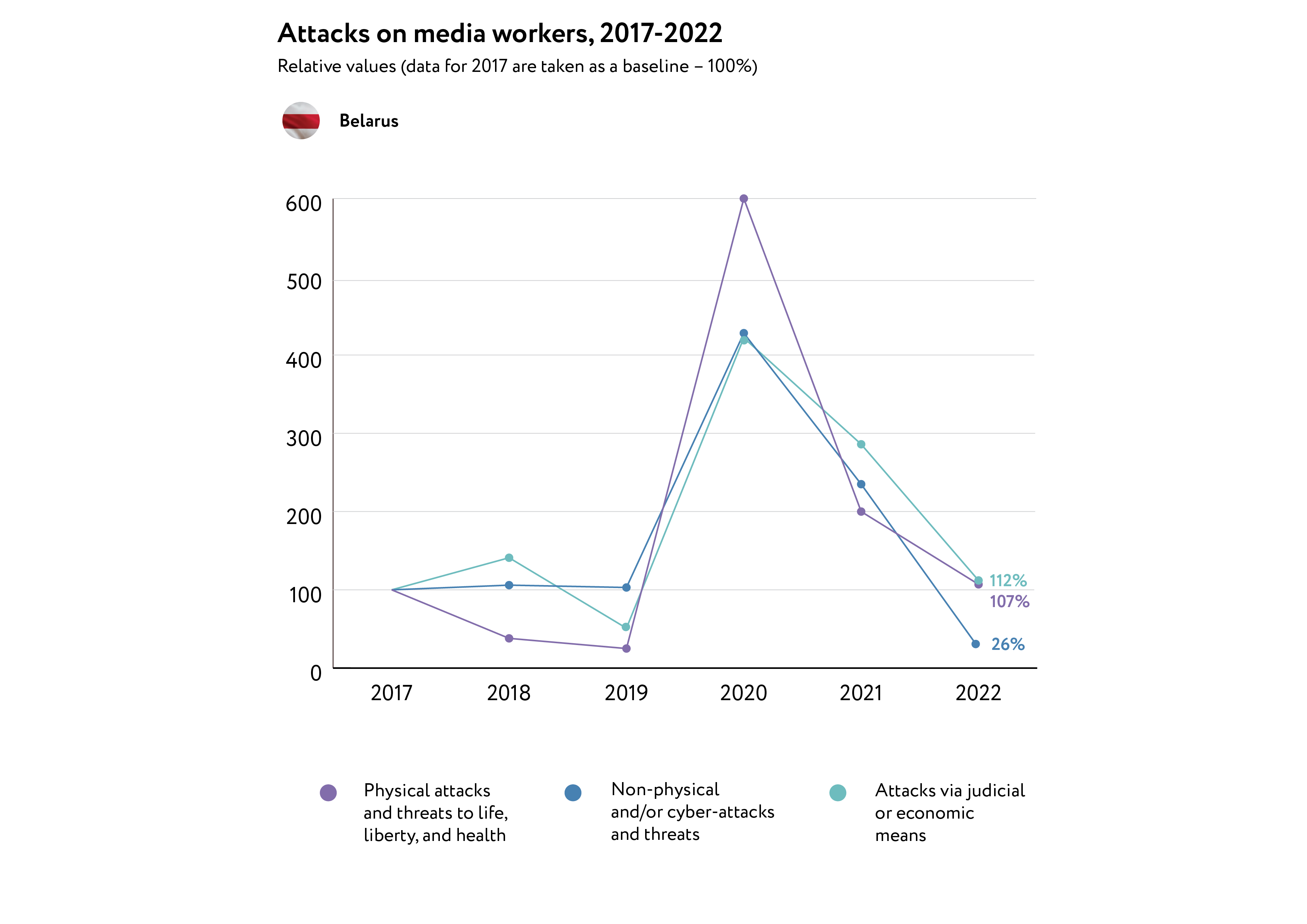
The decrease in the total number of attacks is due to the “Turkmenization” of the situation in Belarus: there are fewer journalists legally operating in the country upon whom pressure can be exerted. Some were arrested, others fled the country, while others left the profession. However, the severity of the attacks on media workers has increased.
Attacks via judicial and/or economic means remain the most common method of exerting pressure on media workers and organisations. Such attacks accounted for 90 percent of the total in 2021, and approximately 94 percent in 2022.
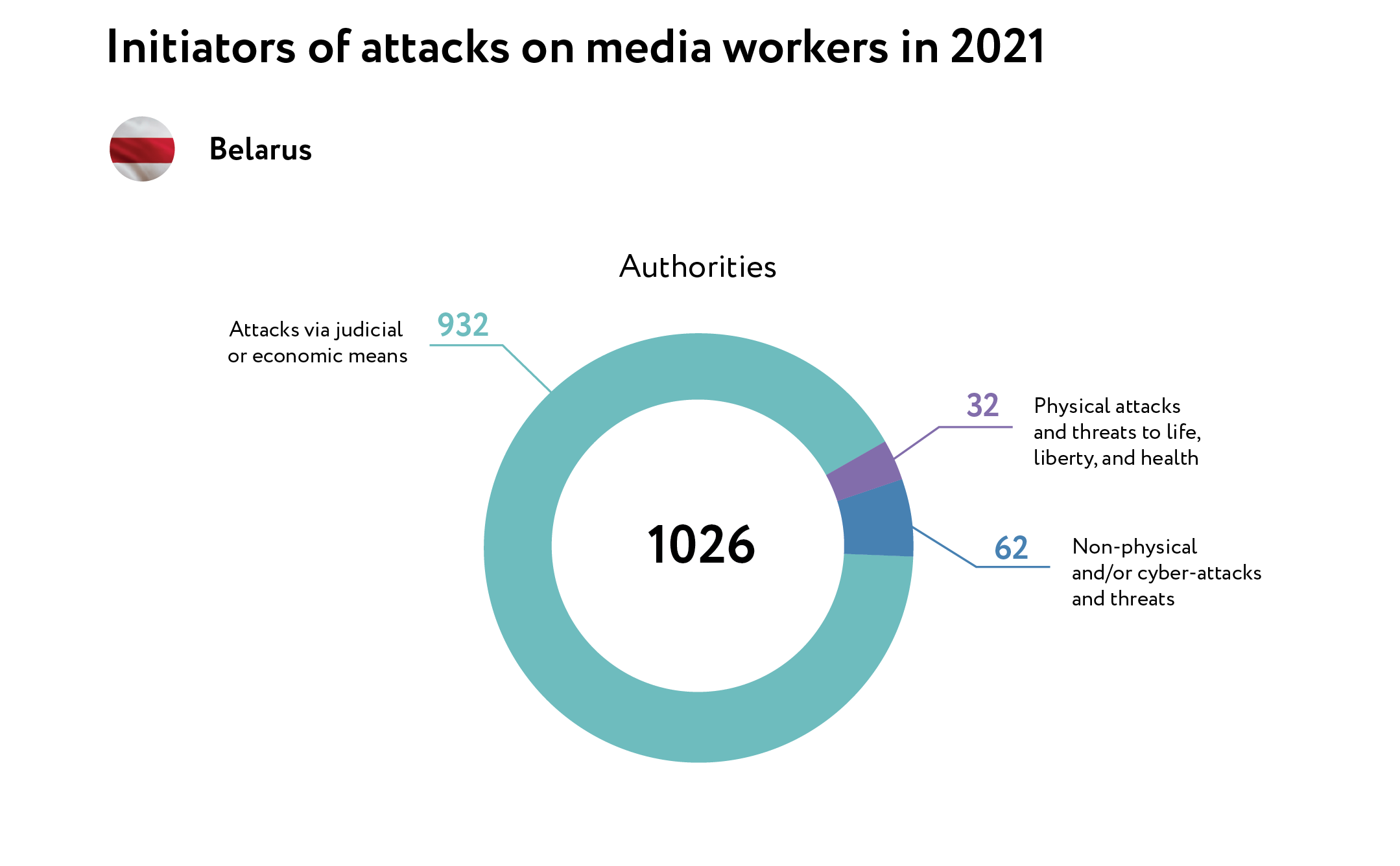
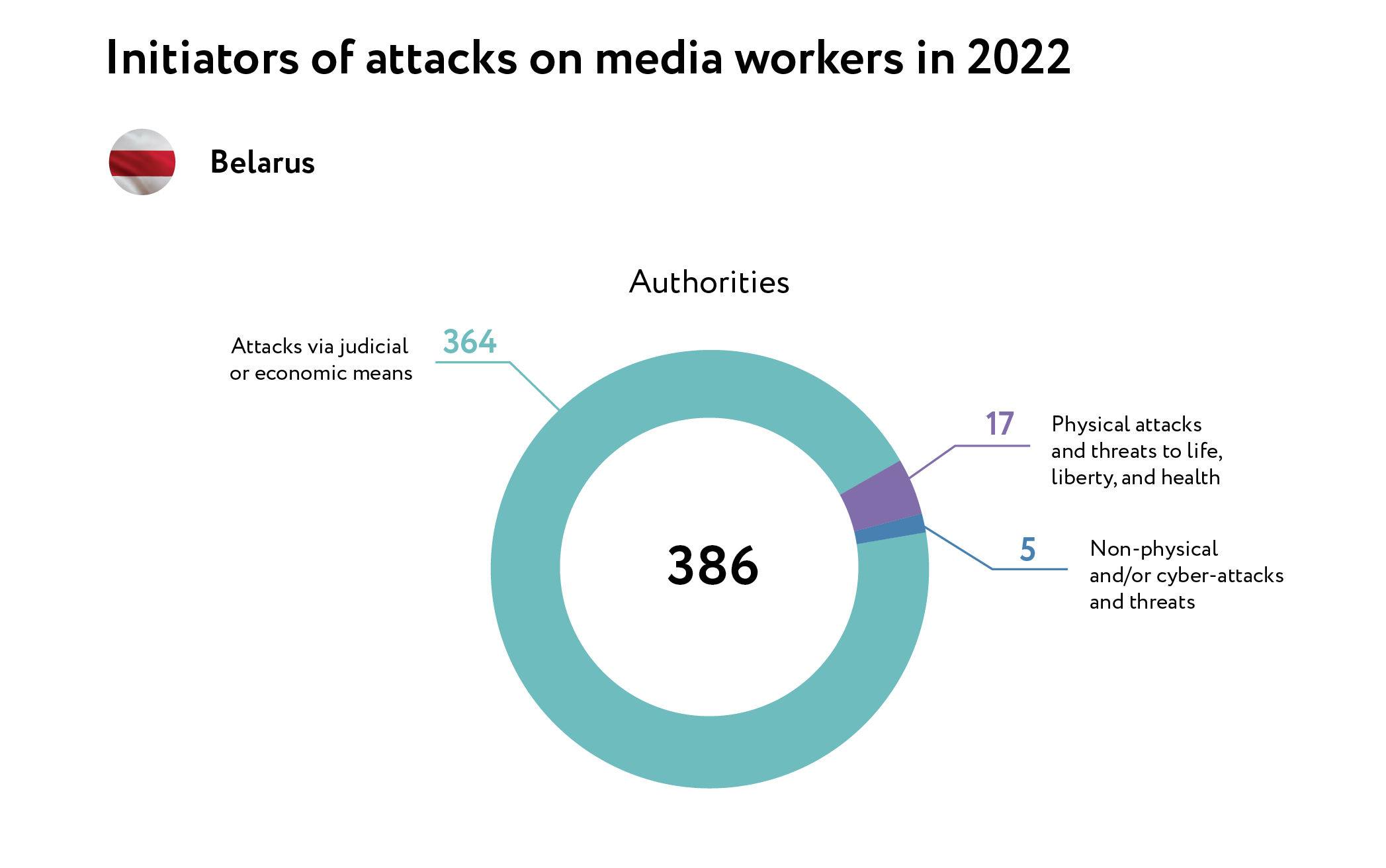
The highest number of physical attacks and threats against journalists was recorded in 2020. For the 2021 to 2022 period, the number of physical attacks dropped six-fold.
4/ PHYSICAL ATTACKS AND THREATS TO LIFE, LIBERTY AND HEALTH
The decrease in the number of physical attacks against journalists in 2021 and 2022 was not due to any kind of improvement in journalists’ safety. On the contrary, this was due to increased pressure on independent media, which led to many journalists leaving both the profession and the country. All recorded attacks in 2021 and 2022 were non-fatal and were committed by government officials.
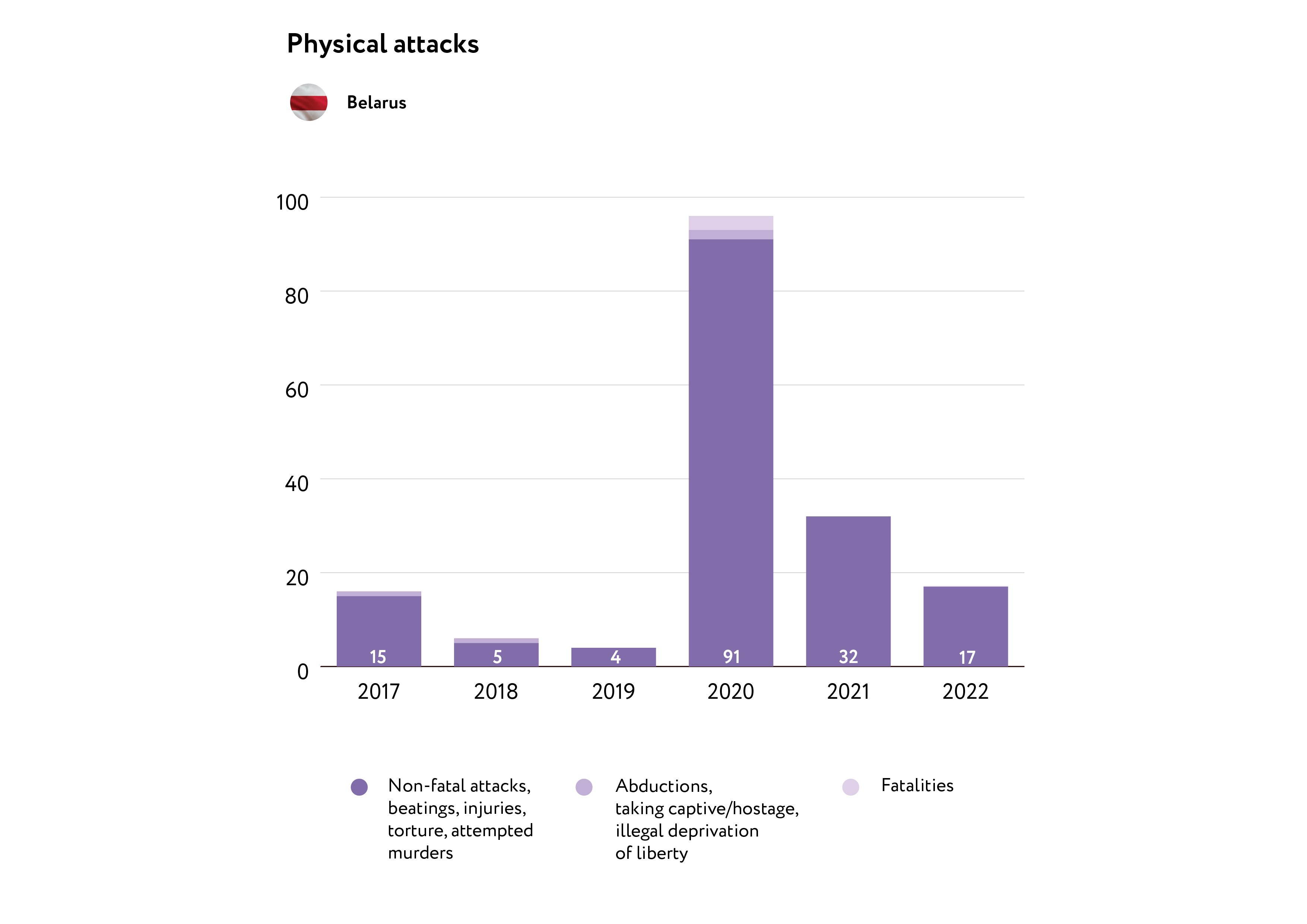
In the past, physical attacks on journalists were associated with their arrest during their coverage of mass protests. However, in 2021 and 2022, the vast majority of recorded cases took place during their time in custody.
- On June 2, 2021, it was revealed that journalist Andrzej Poczobut was deprived of medicine for his heart condition, while he was in prison in Minsk. Poczobut had been held in custody since March 25, 2021, on accusations of “inciting hatred” (Article 130 of the Criminal Code).
- On July 18, 2021, it became known that journalist Andrej Skurko, head of the Nasha Niva marketing and advertising department, was diagnosed with pneumonia while held in a pre-trial detention centre. Prior to this, the journalist was detained for 13 days at the Akrestsina prison. He had no mattress or bedding and was not permitted to leave his cell for exercise. The lights were kept on in his cell at all times, and he was denied medical treatment for his diabetes. According to journalist Oleg Gruzdilovich, who shared a cell with him, on July 18 Andrej had a fever and began to cough, but he was only given paracetamol. According to Skurko’s correspondence with his wife, his insulin, which must be kept in the refrigerator, was kept on the floor.
- On July 28, 2022, police detained journalist Tatyana Matveyeva at a train station as she returned from a business trip. Her apartment was searched, during which two phones, a computer, storage devices, books and postcards were seized. Matveyeva was taken to a temporary detention centre, where she was held for 72 hours. She was released on August 31 with a court summons under Article 24.23 of the Administrative Code (“holding an unauthorised protest”). The conditions in the temporary detention centre were tantamount to torture. There was no bedding, they had to sleep on a metal frame, bright lighting was on in the cell around the clock, and they were not allowed to sit down during the day.
- On December 2, 2022, it was revealed that journalist Katsyaryna Andreeva was subjected to torture-like conditions while she was held in Gomel penal colony No. 4. She was placed in a so-called “press hut”, where her cellmates were encouraged to mock and abuse her. She was also forbidden from communicating with other “political” prisoners.
Another method of pressure, which was particularly widespread in 2022, was the use of “repentance” videos. Law enforcement agencies forced detained media workers to film their confessions under duress and apologise to the government. These videos were then broadcast on state TV and Telegram channels. Such incidents include:
- On June 13, 2022, photographer Evgeny Erchak was arrested. In one photo, he is seen wearing a military helmet and a white-red-white protest sticker, as well as a Nazi emblem. Erchak was called a “fascist” and accused of collaborating with an “extremist” organisation, namely the most popular news site in Belarus, TUT.BY (now named Zerkalo.io). Later, pro-government Telegram channels posted a repentance video featuring Erchak, as well as pictures taken during his apartment search. In the video, Erchak says that he worked as a freelance photographer for TUT.BY, and that in 2020 he “took part in protests and was subscribed to extremist Telegram channels.” On June 29, after 15 days in custody for “disobeying the police”, he was released, but remains at risk of further persecution while police examine his photo and video archives.
- On June 23, 2022, police detained Vitaly Andros, the director of the dev.bu portal, which writes about the IT industry in Belarus and around the world. Accountant Elena Andros was also arrested. A repentance video featuring them appeared on pro-government Telegram channels. In the video, Vitaly claims that they took part in protests in August 2020 and were involved in extremist Telegram channels as well as the “Plan Pobeda” chat bot. According to government reports, “the couple played an important role in the operation of the channel, which incited hatred towards their country in favour of so-called European values.”
5/ NON-PHYSICAL AND/OR CYBER-ATTACKS AND THREATS
2022 was characterised by a sharp decrease in non-physical attacks. Since 2021, the number of attacks in this subcategory decreased nine fold. The main methods of exerting pressure on journalists were deprivation of access to information, harassment, intimidation, threats of violence and hacking journalists’ social media accounts.
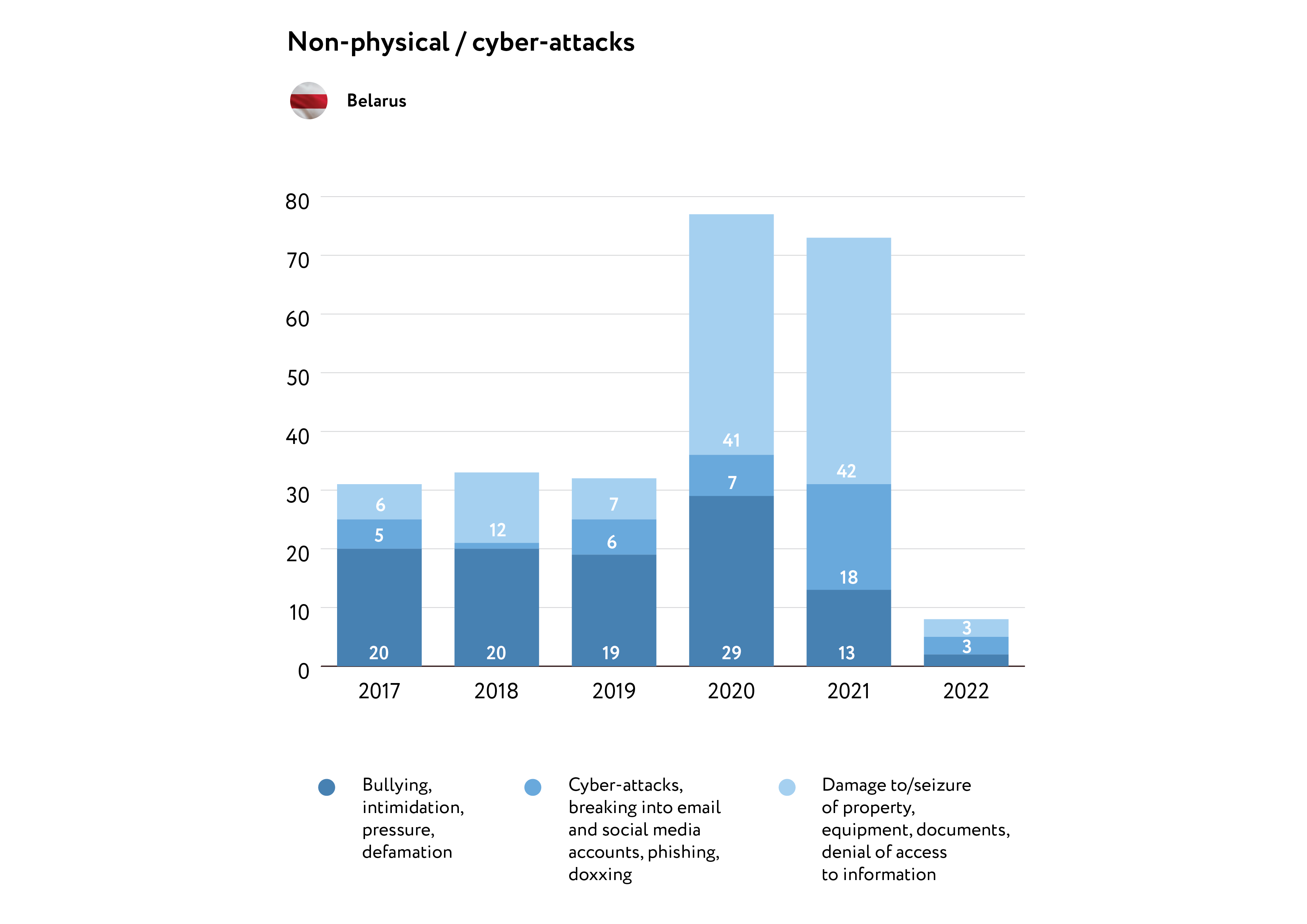
In 2021, the number of cyber-attacks sharply increased, including the hacking of emails and journalists’ Telegram channels, and DDoS attacks. Radio Free Europe/Radio Liberty (RFE/RL), Nasha Niva, Onliner, Charter 97, Narodnaya Volya, Brestskaya Gazeta, Avtobiznes, and others were all subjected to such attacks.
- On February 18, 2021, the Newgrodno.by Telegram channel was hacked by unknown individuals. Editors lost control of the channel entirely. The publication’s editor, Igor Bublikov, claims his personal Telegram channel was hacked on the same day. Two weeks prior to these events, employees of the Leninsky District Department of Internal Affairs in Grodno seized a computer while searching the editorial office.
- On March 26, 2021, hackers temporarily gained access to the Nasha Niva Telegram channel by hacking the accounts of three employees, including Editor-in-Chief Dmitry Pankovets. The name of the channel was changed to an obscene word, all news from March 25 was deleted, and a number of subscribers were blocked.
- On November 25, 2021, the Radio Svaboda Belarus Telegram channel was hacked, during which time links were posted to pro-government resources. The publication later regained control of the channel and deleted the messages.
Damage to property was a particularly common type of attack. This typically took place while journalists’ apartments and offices were searched in a deliberately destructive manner. Such incidents include:
- On July 14, 2021, police broke down the door of the Belarusian Association of Journalists offices, conducted a search, damaged and seized property, then sealed the premises. The organisation’s bank account was blocked. The Investigative Committee claimed that the searches of media organisations and NGOs offices, which took place for several days across the country, were connected with illegal financial activity, tax evasion and the financing of protests.
- On December 23, 2021, masked security personnel forcibly took Aleh Hruzdzilovich, a journalist for RFE/RL’s Belarus Service, from his home after breaking the door down. The journalist was held in a pre-trial detention centre in Minsk.
- On May 23, 2022, it was revealed that security forces had searched Homel journalist Maria Bulavinskaya’s rural home. According to local witnesses, police entered the property by force, before removing a number of items. No official documentation was provided to justify the search. The door was sealed shut with tape.
In addition to this, journalists faced constant illegal obstruction while performing their professional duties during court hearings. In 2021, 30 such incidents were recorded. By 2022, this number had decreased. This is due to a decrease in the number of legally operating independent journalists and media organisations in Belarus, as well as journalists increasingly considering such violations as being less important compared to others, and thus not reporting them.
6/ ATTACKS VIA JUDICIAL AND/OR ECONOMIC MEANS
Attacks of this nature were primarily committed by government officials. Individuals who were not representatives of the authorities were responsible for a mere 6 out of the 938 cases in 2021, and one out of 365 in 2022. However, compared to previous years, the main types of attacks on journalists have shifted.
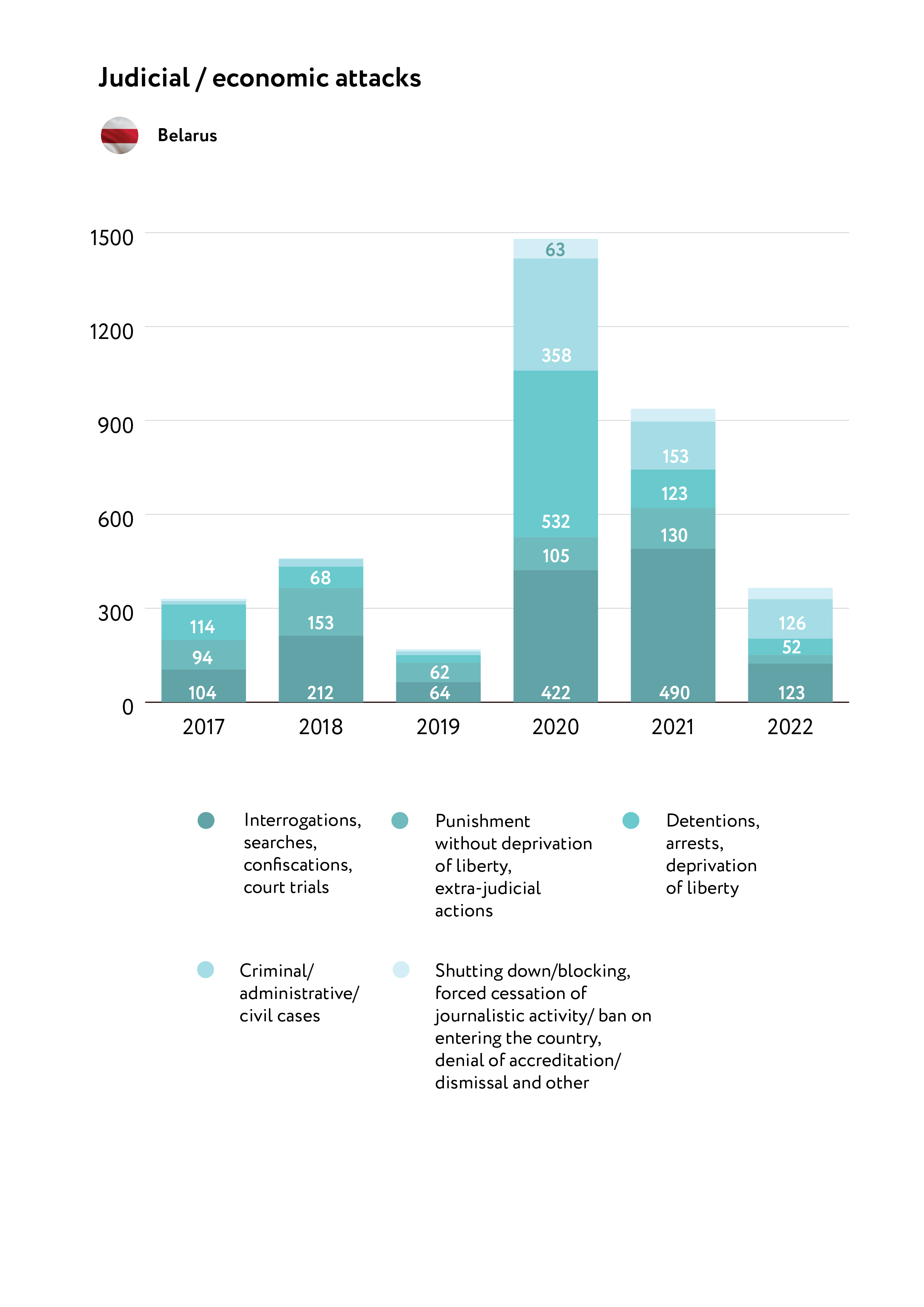
In 2020, the most common type of attack was short-term detentions (297 incidents). After the suppression of protests, numerous journalists were detained. The number of arrests decreased to 39 in 2021, before falling to 8 incidents in 2022.
Criminal penalties against media workers have become tougher, with the duration of the sentences exceeding those given for violent crimes, such as murder. The increase in the number of criminal cases against media workers is due to the prosecution of so-called extremism, inciting hatred, treason, calling for the overthrow of the constitutional order, and the rehabilitation of Nazism. The number of such cases in 2021 and 2022 was significantly higher than in the “crisis” year of 2020. As of May 2023, 33 media workers remain in custody in Belarus.
- On February 5, 2021, Minsk City Court sentenced blogger Pavel Spirin to 4.5 years in a penal colony. He was found guilty of inciting racial, national, and religious hatred (Article 130 of the Criminal Code). This was a result of two videos Spirin posted on YouTube.
- In February 2021, Belsat TV journalist Katsyaryna Andreeva, was sentenced to two years in prison for violating the public order (Article 342 of the Criminal Code) following her live stream of a peaceful protest on the so-called “Square of Changes” in Minsk. Five months before her release, the journalist was charged again, this time for treason (Part 1 of Article 356 of the Criminal Code of Belarus) and on July 13, 2022, was sentenced to eight years in prison.
- On December 14, 2021, the Gomel Regional Court sentenced Ihar Losik, admin of the “Belarus Brain” Telegram channel and RFE/RL consultant, to 15 years in a maximum security prison. Losik was accused of inciting social hatred “against representatives of the authorities and law enforcement agencies” (Part 3 of Article 130 of the Criminal Code) and of organising riots (Part 1 of Article 293 of the Criminal Code). The court also issued fines amounting to 2.5 million BYN (nearly 800,000 GBP) for “criminal damage” to Losik and other politicians, activists and bloggers accused in the same case: Sergei Tikhanovsky, Mikola Statkevich, Vladimir Tsyganovich, Artem Sakov and Dmitry Popov. The trial was held behind closed doors at the Gomel pre-trial detention centre. Losik was detained on June 25, 2020, and was kept behind bars until the trial began.
- On December 17, 2021, the Minsk City Court sentenced blogger Eduard Palčys to 13 years in a maximum security penal colony. Palčys was found guilty under four articles of the Criminal Code: Article 130 (“causing social enmity on the basis of a different social affiliation”), Article 293 (“organising riots”), Article 342 (“gross violations of public order”), and Article 361 (“inciting damage to national security”). Palčys was detained in September 2020, and remained in custody until the trial began.
- On September 7, 2022, the Brest Regional Court fined BelTA journalist Inna Mozhchenko, and sentenced her to three years in prison. Judge Vera Filonik found the journalist guilty under two articles: “insulting a representative of the authorities” (Article 369 of the Criminal Code) and “inciting racial, national and religious hatred” (Part 1 of Article 130 of the Criminal Code). Mozhchenko was prosecuted following comments made about the killing of IT worker Andrei Zeltser by security forces in September 2021.
- On September 14, 2022, Dzianis Ivashyn, an investigative journalist from Novy Chas, was sentenced to 13 years in a maximum security prison. Judge Valery Romanovsky, at the Grodno Regional Court, found Ivashyn guilty under two articles: “interfering in the activities of a member of the ministry of internal affairs” (Article 365 of the Criminal Code) and “treason” (Part 1 of Article 356 of the Criminal Code). The journalist must also pay 2,000 BYN (632 GBP) in compensation to each of the nine (currently unknown) victims. Ivashyn’s trial was held behind closed doors following his arrest by the KGB on March 12, 2021.
- On September 28, 2022, Ksenia Lutskina, who previously worked as a journalist for the state-owned “Belteleradiocompany”, was sentenced to eight years in prison. The Minsk City Court found her guilty of “conspiring to seize power” (Part 1 of Article 357 of the Criminal Code). The verdict was handed down by Judge Tatyana Falkovskaya. Following the 2020 presidential elections, Lutskina left her position at the channel and joined the Coordinating Council, a public organisation created by the democratic opposition to ensure the transfer of power in Belarus. Together with her colleagues, Lutskina worked on other television projects, but was detained on December 22, 2020. According to the Prosecutor General’s Office, Lutskina “concealed and distorted facts, incited protests, aimed to sow discord among Belarusian society, and discredited the government.” In a pre-trial detention centre, Ksenia’s health deteriorated following the discovery of a brain tumour, which still requires treatment.
- On October 26, 2022, blogger and ex-ONT TV employee, Vladislav Savin, was sentenced to two years in prison for insulting president Lukashenko (Part 1 of Article 368 of the Criminal Code). Prosecutor Vadim Karachun said that the “insult” was found during consideration of Savin’s first verdict appeal. “While in prison, I prepared an appeal containing an insult towards the President of Belarus, after which it was sent on to the Minsk City Court,” Savin said.
- On October 26, 2022, investigative journalist Siarhei Satsuk was sentenced to eight years in a maximum security prison. Judge Svetlana Bondarenko found Satsuk guilty on three counts: accepting bribes (Part 2 of Article 430 of the Criminal Code), inciting hatred (Part 2 of Article 130 of the Criminal Code) and abuse of authority (Part 2 of Article 426 of the Criminal Code). The court also imposed a fine of 16,000 BYN (5056.20 GBP) and banned the journalist from holding leadership positions for at least five years. In addition, the court seized some of the journalist’s property. Satsuk’s colleagues believe he was prosecuted due to his high-profile investigations related to widespread corruption in the medical field.
- On October 27, 2022, the Minsk City Court sentenced journalist Ales Lyubenchuk to three years in prison. The journalist was accused of founding, or participating in, an extremist group (Part 3 of Article 361-1 of the Criminal Code). The case was heard by Judge Elena Ananich, but the basis of the accusation remains unknown. Lyubenchuk told relatives that during his pre-trial imprisonment in Minsk, his health deteriorated significantly. Previously, Lubenchuk collaborated with the Belsat TV channel, which in November 2021 was labelled by the Belarusian authorities as an “extremist organisation”. The journalist also worked in the tourism sector and was involved in the restoration of the historical and cultural heritage of his region.
- On December 26, 2022, freelance videographer Ivan Muravyov was sentenced to two and a half years in prison. Judge Elena Shilko, of the Minsk City Court, found Muravyov guilty of “participation in an extremist organisation” (Part 3 of Article 361-1 of the Criminal Code). This was due to Muravyov’s work with the Belsat TV channel, which had been recognised by the authorities as an extremist organisation.
The number of cases related to the closure of media outlets, obstructing printed publications, and blocking access to online materials in Belarus has increased significantly, even compared to 2020.
- On January 14, 2021, the independent publication Brestskaya Gazeta faced problems publishing print issues. The Brest printing house terminated their contract with the editorial office without explanation. Other printing houses in Belarus also refuse to work with Brestskaya Gazeta.
- On December 29, 2021, the Ministry of Information blocked the website of the Baranavichy edition of Intex-press. The website remains inaccessible in Belarus. Minister of Information, Vladimir Pertsov, stated that this was due to “violations of mass media legislation regarding the dissemination of prohibited information.”
- On December 31, 2021, the editors of First Region reported issues accessing the site in Belarus. On January 3, 2022, it was revealed that the First Region website (1reg.by) was blocked by the order of the Brest regional prosecutor Viktor Klimov. The website of the Prosecutor General’s Office stated that “numerous violations” of laws relating to mass media were broken.
- On June 14, 2022, TUT BY MEDIA LLC, the owner of the TUT.BY portal, was labelled an extremist organisation. According to the court decision, the organisation was to be shut down entirely.
- On August 23, 2022, the Ministry of Information announced that the socio-political publication Gazeta Slonimskaya and the advertising newspaper Otdushina would have their state official registration revoked. The ministry claimed that these publications had not been published for six consecutive months (Part 2 of Article 16 of the Law “On Mass Media”). “Neither the Grodno, nor the Brest or Pinsk printing houses printed Gazeta Slonimskaya or Oddushina newspapers due to a busy printing schedule” the editorial office explained.
- On December 1, 2022, the independent economic newspaper Belorusy i Rynok ceased publication after 32 years. Vladimir Pertsov, of the Ministry of Information annulled their certificate of state registration, Citing Part 2.8, Paragraph 2 of Article 16 of the Law “On Mass Media”.
It is worth emphasising that not all cases of violation of journalists’ rights are recorded on the Media Risk Map. Often journalists, or their relatives, are afraid of publicly disclosing any attacks following intimidation from law enforcement agencies. In addition to this, in an atmosphere of increasing repression, many media workers consider certain types of rights violations, such as a restriction of access to information, to be insignificant and as such do not report them.
In 2021 and 2022, we recorded 21 cases of forced emigration of media workers due to legal and economic pressure. However, many more journalists and media workers left Belarus. The majority either do not consider temporary relocation to be emigration per se, or do not wish to report a change in their place of residence for security reasons.
ANNEX 1: OPEN SOURCES USED FOR GATHERING DATA (BELARUS)
- Belorussian Association of Journalists –non-governmental, non-profit and non-partisan association of media workers, promoting freedom of expression and independent journalism ideas in Belarus.
- Ministry of Information of the Republic of Belarus –a national government agency in the field of mass media that has serious administrative and sanction powers (from registering mass media to initiating their closure, as well as extrajudicial blocking of Internet resources).
- Belsat – a Polish free-to-air satellite television channel aimed at Belarus.
- Belapan –an independent news agency of Belarus.
- Belta – state news agency created to disseminate information about the activities of the state bodies of Belarus.
- TUT.BY – leading information website of Belarus.
- Reporters Without Borders – an international non-profit and non-governmental organization that safeguards the right to freedom of information.
- Belarusian and English-language resources that are available online.
